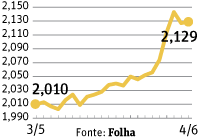Latest Photo Galleries
Brazilian Markets
17h31 Bovespa |
+1,09% | 128.509 |
16h43 Gold |
0,00% | 117 |
17h00 Dollar |
-0,83% | 5,0697 |
16h30 Euro |
+0,49% | 2,65250 |
ADVERTISING
President Rousseff Cuts Tax to Slow Down Dollar Spike
06/05/2013 - 08h21
Advertising
MARIANA SCHREIBER
VALDO CRUZ
FROM BRASILIA
The Dilma Rousseff administration decided to eliminate the IOF (Tax on Financial Transactions) on foreign investors who invest in fixed income securities - the tax was 6%.
In fact, the measure will attract more dollar investments, which will reduce the price of that currency as well as the pressure on inflation.
The IOF cut was announced by Finance Minister Guido Mantega, who justified the decision by stating there is no longer an "avalanche" of foreign investments for that kind of investment as there was in October 2010, when the tax was raised twice.
| Editoria de Arte/Folhapress |
 |
| Price of dollar, in reais |
Mantega also tried not to link the measure to government concerns with the impact on inflation: "There is no intention to create an anti-inflation policy through the currency exchange rate. The anti-inflation instruments are those recently used by the Central Bank."
Despite Mantega's denial, Folha verified that the government is worried about the inflationary pressure caused by the appreciation of the dollar, which has reflected on the decision to raise taxes to slow down consumption.
Government analysts and technicians were working with the possibility of the dollar rising to R$ 2.20 in the coming days, which in the mid-term, would have a relevant impact on inflation.
Mantega said the "exchange rate is on its way to a more natural balance," and for that reason, there was a reduction in the government interventions in the market. "There isn't a baseline for the exchange rate any more. It is a floating rate in Brazil. What the government tries to do is to prevent excesses, because volatility isn't good for the market, importers, exporters and investors," he said.
Translated by THOMAS MUELLO



